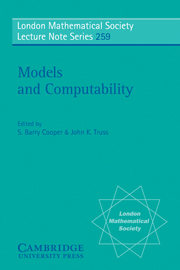Book contents
- Frontmatter
- Contents
- Preface
- Continuous Functionals of Dependent and Transfinite Types
- Degree-Theoretic Aspects of Computably Enumerable Reals
- Simplicity and Independence for Pseudo-Algebraically Closed Fields
- Clockwork or Turing U/universe? - Remarks on Causal Determinism and Computability
- A Techniques Oriented Survey of Bounded Queries
- Relative Categoricity in Abelian Groups
- Computability and Complexity Revisited
- Effective Model Theory: The Number of Models and Their Complexity
- A Survey on Canonical Bases in Simple Theories
- True Approximations and Models of Arithmetic
- On the Topological Stability Conjecture
- A Mahlo-Universe of Effective Domains with Totality
- Logic and Decision Making
- The Sheaf of Locally Definable Scalars over a Ring
- Human Styles of Quantificational Reasoning
- Recursion Theoretic Memories 1954–1978
- Fields Definable in Simple Groups
- A Combinatory Algebra for Sequential Functionals of Finite Type
- Model Theory of Analytic and Smooth Functions
Continuous Functionals of Dependent and Transfinite Types
Published online by Cambridge University Press: 17 May 2010
- Frontmatter
- Contents
- Preface
- Continuous Functionals of Dependent and Transfinite Types
- Degree-Theoretic Aspects of Computably Enumerable Reals
- Simplicity and Independence for Pseudo-Algebraically Closed Fields
- Clockwork or Turing U/universe? - Remarks on Causal Determinism and Computability
- A Techniques Oriented Survey of Bounded Queries
- Relative Categoricity in Abelian Groups
- Computability and Complexity Revisited
- Effective Model Theory: The Number of Models and Their Complexity
- A Survey on Canonical Bases in Simple Theories
- True Approximations and Models of Arithmetic
- On the Topological Stability Conjecture
- A Mahlo-Universe of Effective Domains with Totality
- Logic and Decision Making
- The Sheaf of Locally Definable Scalars over a Ring
- Human Styles of Quantificational Reasoning
- Recursion Theoretic Memories 1954–1978
- Fields Definable in Simple Groups
- A Combinatory Algebra for Sequential Functionals of Finite Type
- Model Theory of Analytic and Smooth Functions
Summary
Introduction
In this paper we study some extensions of the Kleene-Kreisel continuous functionals and show that most of the constructions and results, in particular the crucial density theorem, carry over from finite to dependent and transfinite types. Following an approach of Ershov we define the continuous functionals as the total elements in a hierarchy of Ershov-Scott-domains of partial continuous functionals. In this setting the density theorem says that the total functionals are topologically dense in the partial ones, i.e. every finite (compact) functional has a total extension. We will extend this theorem from function spaces to dependent products and sums and universes. The key to the proof is the introduction of a suitable notion of density and associated with it a notion of co-density for dependent domains with totality. We show that the universe obtained by closing a given family of basic domains with totality under some quantifiers has a dense and co-dense totality provided the totalities on the basic domains are dense and co-dense and the quantifiers preserve density and co-density. In particular we can show that the quantifiers Π and Σ have this preservation property and hence, for example, the closure of the integers and the booleans (which are dense and co-dense) under Π and Σ has a dense and co-dense totality. We also discuss extensions of the density theorem to iterated universes, i.e. universes closed under universe operators.
- Type
- Chapter
- Information
- Models and Computability , pp. 1 - 22Publisher: Cambridge University PressPrint publication year: 1999
- 1
- Cited by



